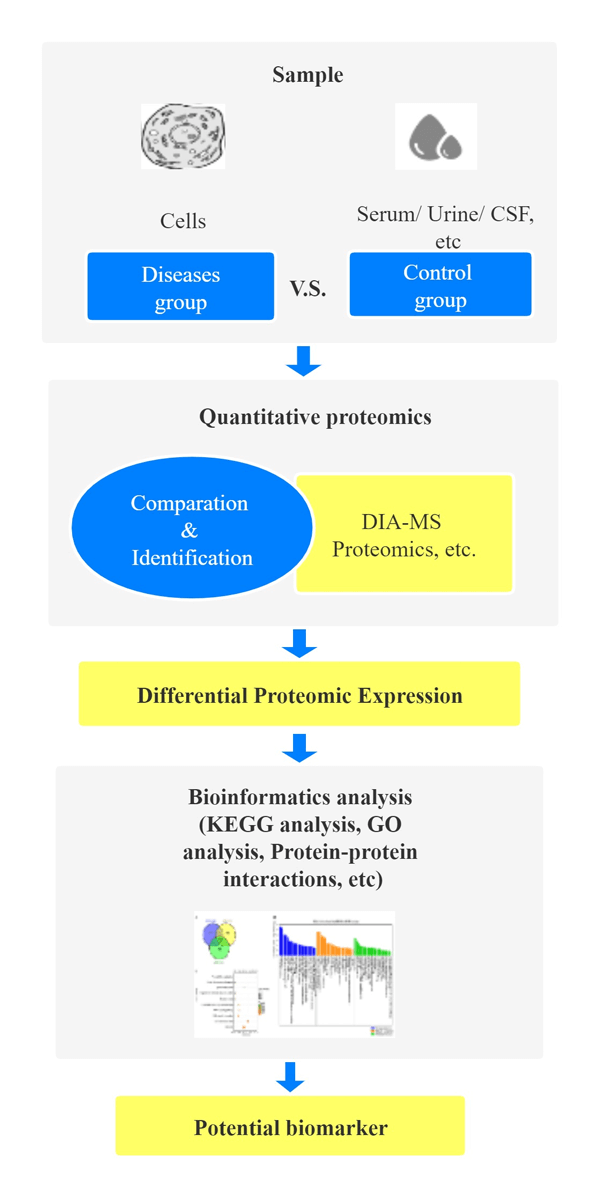Tissue Biomarker Discovery Solutions
Discover Your Tissue Biomarkers
With the gradual change of medical treatment from traditional passive treatment to active prevention and diagnosis, especially the emergence and mainstreaming of individualized medicine, the research and development of biomarkers have become a hot topic in the clinical and pharmaceutical fields in recent years. The detection of biomarkers can provide objective information on physiopathological processes, disease development, treatment, and prognosis in normal and disease states. Correspondingly, biomarkers can be classified into different categories according to their various functions. Early detection markers are mainly used for the detection of some early clinical diseases.
The use of DIA (Data-independent acquisition) holographic scanning proteomics technology enables high-throughput detection of large cohorts while ensuring high reproducibility and stability of the technology and data. Among the selected markers, clinical data and machine learning methods are further combined to comprehensively evaluate the markers to verify the reliability of the markers again.
Tissue Proteomics
Routine proteomic analysis of patient tissues has become an important tool for biomarker discovery. Tissue-based proteomic strategies have been applied to the study of many diseases such as cancer. The general idea is to compare disease tissue samples with "healthy" adjacent controls from the same patient in order to find potential diagnostic biomarkers. At the same time, information on the prognosis of patients at different stages of the disease is compared. Once a small number of candidate proteins have been identified, pathway analysis provides insight into how these proteins are associated with disease onset, proliferation, and metastasis. Subsequent antibody-based techniques are often used to complement/validate differential expression results in larger independent cohorts.
Our Tissue Biomarker Discovery Services
Creative Proteomics's tissue biomarker discovery applies DIA MS technologies to overcome the limitations of targeted approaches to identify novel biomarkers. Our advanced technologies in these next-generation proteomics enable the quantification of the complete proteome and phosphoproteome, uncovering new potential biomarkers to accelerate disease diagnostic, treatment, and prognosis diagnostic processes.
The service has unprecedented depth and throughput to identify differentially regulated proteins in a hypothesis-free manner. We also provide highly multiplexed targeted proteomics with absolute quantification capabilities for custom protein panels.
Workflow

Advantages
- High accuracy: QC CV as low as 25% for large projects
- High-throughput: quantify up to 9,000 proteins per sample
- Large-scale: Allow analysis of thousands of samples
- Standard data and advanced data analysis
Sample Requirements
Our Tissue biomarker discovery services can be applied to all types of solid biological matrices such as frozen tissue, FFPE slides, or almost any species of cell culture.
| Sample Type | Fresh frozen | # of Cells | FFPE slices |
| Quantify | 1 mg | 1×107 cells | 2×5μm FFPE slices (each 50-100mm2) |
Report
- Experimental steps
- Relevant experiment parameters
- Mass spectrometry spectra
- Raw data
- Proteomics analysis results
Our Tissue Biomarker Discovery Services is ideal for long-term projects or projects with large sample sets that require accurate and reproducible quantitation. Please get in touch with us for more details.


 4D Proteomics with Data-Independent Acquisition (DIA)
4D Proteomics with Data-Independent Acquisition (DIA)